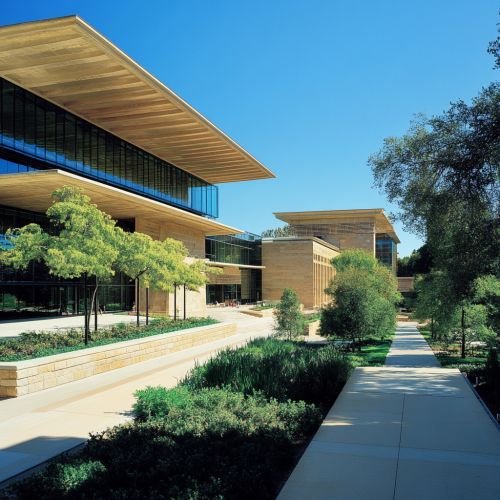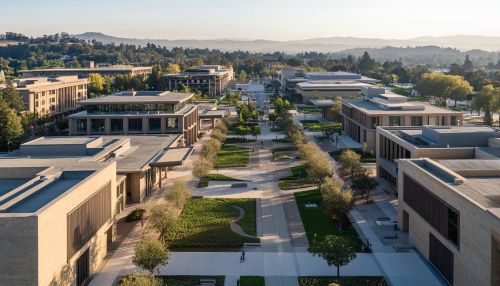Stanford Center for Internet and Society
Overview
The Stanford Center for Internet and Society (CIS) is an interdisciplinary research center at Stanford Law School that focuses on the complex interactions between the Internet, law, and society. Established in 2000, the center is renowned for its pioneering work in exploring the legal, social, and technical dimensions of the internet and related technologies. The CIS serves as a hub for scholars, policymakers, technologists, and legal practitioners to collaborate on issues that shape the digital landscape.
History
The CIS was founded by Lawrence Lessig, a prominent legal scholar and advocate for internet freedom, who recognized the need for a dedicated institution to address the emerging legal challenges posed by the internet. Since its inception, the center has been instrumental in shaping the discourse around internet governance, digital rights, and technology policy. Over the years, the CIS has expanded its scope to include a wide range of topics, from privacy and cybersecurity to intellectual property and free expression.
Mission and Objectives
The mission of the CIS is to advance understanding and foster dialogue about the legal and policy implications of the internet and emerging technologies. The center aims to:
1. Conduct cutting-edge research on internet and technology law. 2. Provide a platform for interdisciplinary collaboration. 3. Influence policy and legal frameworks through scholarship and advocacy. 4. Educate the next generation of leaders in technology law and policy.
Research Areas
The CIS engages in a diverse array of research areas, reflecting the multifaceted nature of internet and technology law. Some of the key areas of focus include:
Privacy and Data Protection
Privacy and data protection are central concerns in the digital age. The CIS explores issues related to personal data collection, surveillance, and the balance between privacy rights and security needs. The center's work in this area often intersects with discussions on GDPR and other regulatory frameworks.
Intellectual Property
Intellectual property (IP) law is a critical area of study at the CIS, particularly in the context of digital content and innovation. The center examines the impact of IP laws on creativity, access to information, and technological advancement. Topics such as copyright, patents, and Creative Commons licensing are frequently explored.
Cybersecurity and Cybercrime
As cyber threats become increasingly sophisticated, the CIS addresses the legal and policy challenges associated with cybersecurity and cybercrime. Research in this area includes the development of legal frameworks for combating cyber threats and the ethical implications of cybersecurity measures.
Free Expression and Censorship
The internet has transformed the landscape of free expression, raising complex questions about censorship, platform liability, and content moderation. The CIS investigates the tension between protecting free speech and preventing harmful content online, contributing to debates on Net Neutrality and platform governance.
Technology and Human Rights
The intersection of technology and human rights is a growing area of interest for the CIS. The center examines how digital technologies can both advance and threaten human rights, focusing on issues such as digital inclusion, algorithmic bias, and the right to access information.
Initiatives and Projects
The CIS is involved in numerous initiatives and projects that aim to address pressing issues in internet and technology law. Some notable projects include:
The Fair Use Project
The Fair Use Project is dedicated to promoting and defending the fair use doctrine, which allows for the limited use of copyrighted material without permission under certain circumstances. This project provides legal support for cases that have the potential to shape the future of fair use.
The Intermediary Liability Project
This project explores the legal responsibilities of internet intermediaries, such as social media platforms and internet service providers, in relation to user-generated content. The CIS advocates for balanced liability frameworks that protect both free expression and the rights of individuals.
The Artificial Intelligence and Ethics Project
With the rise of artificial intelligence (AI), the CIS examines the ethical and legal implications of AI technologies. This project addresses issues such as algorithmic transparency, accountability, and the societal impact of AI systems.


Education and Outreach
The CIS is committed to educating students, professionals, and the public about internet and technology law. The center offers a variety of educational programs, including:
1. **Courses and Workshops**: The CIS provides courses and workshops at Stanford Law School, covering topics such as cybersecurity law, digital privacy, and technology policy.
2. **Fellowship Programs**: The center hosts fellowship programs for scholars and practitioners who wish to conduct research in internet and technology law.
3. **Public Events and Conferences**: The CIS organizes public events, conferences, and lectures that bring together experts from various fields to discuss current issues in internet law and policy.
Impact and Influence
The CIS has had a significant impact on the field of internet and technology law, influencing both academic scholarship and policy development. The center's research has informed legislative and regulatory processes, and its faculty and fellows frequently contribute to public debates on technology-related issues. The CIS's work has also been instrumental in shaping the legal frameworks that govern the internet and digital technologies.
